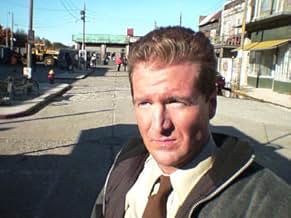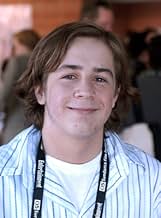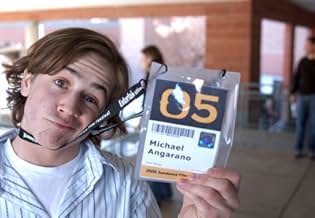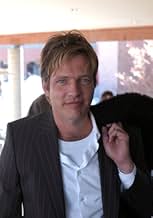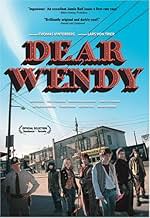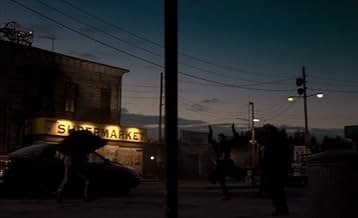VALUTAZIONE IMDb
6,5/10
10.616
LA TUA VALUTAZIONE
Un ragazzino, che vive in una cittadina americana senza nome e senza tempo, fonda una banda di giovani disadattati, uniti dall'amore per le armi e da un proprio codice d'onore.Un ragazzino, che vive in una cittadina americana senza nome e senza tempo, fonda una banda di giovani disadattati, uniti dall'amore per le armi e da un proprio codice d'onore.Un ragazzino, che vive in una cittadina americana senza nome e senza tempo, fonda una banda di giovani disadattati, uniti dall'amore per le armi e da un proprio codice d'onore.
- Regia
- Sceneggiatura
- Star
- Premi
- 1 vittoria e 5 candidature totali
Recensioni in evidenza
First of all Dear Wendy is a tribute to Kubrick: We have the gang from A clockwork Orange, the gun named Lyndon (and the ancient guns) from Barry Lyndon. And there are more subtle references: a chart from one of the bullets reads Full Metal Jacket, etc.
Although directed by his friend Vinterberg the story is written by von Trier and bears all the marks of a von Trier-movie, but this time it is deeply drawn up in irony. A typical Von Trier-story always watches like literature: idealist gains strength from his beliefs but is confronted by the real world (in this case an ex-con), his beliefs are shaken and self-imposed rules are broken. And enter the tragedy.
The US-setting fits the teasing we are now familiar with from von Trier but the wider meaning is much more universal and it raises several interesting questions. Can a society be free of gun violence when people have guns readily available (US vs Switzerland)? Is gun culture and adoration a wider problem than guns themselves? Or do people need guns in order to rise against any form of eventual dictatorship? What does pacifism mean?
This is a very refreshing movie from Vinterberg-von Trier. It is an interesting study in irony and gun culture with good camera-work from Anthony Dod Mantle and interesting special effects. Would certainly have made a splash and controversy at Cannes.
Although directed by his friend Vinterberg the story is written by von Trier and bears all the marks of a von Trier-movie, but this time it is deeply drawn up in irony. A typical Von Trier-story always watches like literature: idealist gains strength from his beliefs but is confronted by the real world (in this case an ex-con), his beliefs are shaken and self-imposed rules are broken. And enter the tragedy.
The US-setting fits the teasing we are now familiar with from von Trier but the wider meaning is much more universal and it raises several interesting questions. Can a society be free of gun violence when people have guns readily available (US vs Switzerland)? Is gun culture and adoration a wider problem than guns themselves? Or do people need guns in order to rise against any form of eventual dictatorship? What does pacifism mean?
This is a very refreshing movie from Vinterberg-von Trier. It is an interesting study in irony and gun culture with good camera-work from Anthony Dod Mantle and interesting special effects. Would certainly have made a splash and controversy at Cannes.
I went into this film extremely hesitant. I don't know Vinterberg well, but I do know there isn't much about Lars that I like at all. Top that with a subject matter that I'm rather sensitive about as well. But the film was beautifully filmed and the performances were enjoyable. I enjoyed all of it. I disagree with critics who say the film attacked America or had a heavy-hitting message in it. I think it's subtler than that. For me it was the big surprise of Sundance 05. Rich and fun. In the script, the characters were twice as old as those in the film, and I think Vinterberg made a wise choice in changing that. What is powerful in a teenager can look dorky in a 30-something.
I saw this movie in France with a large group of friends, something I highly recommend. We all seemed to have a different take on the film and each of us was able to draw something unique from it. Some loved it; some hated it. One of us focused on the powerful characters, another on the coming-of-age aspect, another on the gun control issues, etc. I saw it as a commentary on the power of fear in light of current world events and about how allowing that fear to control your life can ultimately bring about the very tragedy of which you are most afraid.
Dear Wendy certainly lends itself well to conversations that surpass the standard post-movie fare. I am looking forward to it coming stateside so I can see it again with other friends and see what reactions the film provokes in them ...
Dear Wendy certainly lends itself well to conversations that surpass the standard post-movie fare. I am looking forward to it coming stateside so I can see it again with other friends and see what reactions the film provokes in them ...
This flick, with its subtle views on America's obsession with weapons, is likely not going to be a crowd pleaser. One of the main reasons for this is the films use of highly symbolic mise-en-scene takes several viewings to fully appreciate. Another reason for the let down is that some might be inclined to want more action for a movie that centralizes on guns.
However, this movie is brilliant. The shot composition, the editing, the acting-this movie is very well pieced together. Also, as for the meaning of the movie, it goes in a direction that is a really provocative and fresh. I would highly recommend that you give this movie a chance, and keep an open mind. I have never been a fan of the director of this film or the writer, but I was deeply pleased by this film.
However, this movie is brilliant. The shot composition, the editing, the acting-this movie is very well pieced together. Also, as for the meaning of the movie, it goes in a direction that is a really provocative and fresh. I would highly recommend that you give this movie a chance, and keep an open mind. I have never been a fan of the director of this film or the writer, but I was deeply pleased by this film.
"Dear Wendy" comes from the talents that brought us "Festen" and "It's All About Love" (both written and directed by Thomas Vinteberg), "Dogville," "Dancer in the Dark" and "Breaking the Waves" (written and directed by Lars Von Trier). They have collaborated on Dear Wendy, with Vinteberg at the helm and penned by Trier.
This is my favorite kind of movie; it begins with a "what if..." premise, which the storytellers follow with relentless commitment. In this case, the premise is "what if some misfit kids fell in love with their guns." Well, they'd give them names, they'd practice shooting and have a secret clubhouse, they'd study the famous gun-toting heroes of old, and the relationship they have with their weapons would become a mirror for their relationships with the world. All of which are pursued beautifully in the film.
Quite a few American movie critics read this film as a critique of American society, and they resent a European making a film about small-town America. An oft-vented complaint is that Trier has no business criticizing a country which he's never actually visited. I don't think, however, that this is ultimately a film about guns; the relationship these kids have with their guns is simply a unique window through which the filmmakers have chosen to show us the rich inner lives of the protagonists. They could have used a dysfunctional family (Festen), or movie musicals (Dancer In The Dark) or a tolling church bell (Breaking The Waves) to show us that world - but in this case it's guns.
Within the limits of the film medium - 10,000 words of dialog and around 140,000 frames of film - the choices of the filmmaker often revolve about what to leave OUT rather than what to put IN. This is a film that could be used as a textbook for economists. The script is tight - not a word out of place, although the narration feels conversational and casual. A film about child misfits and their guns could easily follow thematic red herrings all over the place in pursuit of social commentary, but "Dear Wendy" is utterly restrained - in spite of the "loaded" subject matter. On the cutting room floor are social commentary, cliché, and many of the cinematic crutches which Trier and Vinterberg rejected in their Dogme 95 days.
Any film lover who cares to see a film utterly committed to its premise, a film made with economy and efficiency, a film full of sweet irony, a film of deceptive simplicity, would do well to check out "Dear Wendy."
This is my favorite kind of movie; it begins with a "what if..." premise, which the storytellers follow with relentless commitment. In this case, the premise is "what if some misfit kids fell in love with their guns." Well, they'd give them names, they'd practice shooting and have a secret clubhouse, they'd study the famous gun-toting heroes of old, and the relationship they have with their weapons would become a mirror for their relationships with the world. All of which are pursued beautifully in the film.
Quite a few American movie critics read this film as a critique of American society, and they resent a European making a film about small-town America. An oft-vented complaint is that Trier has no business criticizing a country which he's never actually visited. I don't think, however, that this is ultimately a film about guns; the relationship these kids have with their guns is simply a unique window through which the filmmakers have chosen to show us the rich inner lives of the protagonists. They could have used a dysfunctional family (Festen), or movie musicals (Dancer In The Dark) or a tolling church bell (Breaking The Waves) to show us that world - but in this case it's guns.
Within the limits of the film medium - 10,000 words of dialog and around 140,000 frames of film - the choices of the filmmaker often revolve about what to leave OUT rather than what to put IN. This is a film that could be used as a textbook for economists. The script is tight - not a word out of place, although the narration feels conversational and casual. A film about child misfits and their guns could easily follow thematic red herrings all over the place in pursuit of social commentary, but "Dear Wendy" is utterly restrained - in spite of the "loaded" subject matter. On the cutting room floor are social commentary, cliché, and many of the cinematic crutches which Trier and Vinterberg rejected in their Dogme 95 days.
Any film lover who cares to see a film utterly committed to its premise, a film made with economy and efficiency, a film full of sweet irony, a film of deceptive simplicity, would do well to check out "Dear Wendy."
Lo sapevi?
- QuizIn Lars von Trier's script, the main characters were in their 20s. Director Thomas Vinterberg decided to change it, so they became children instead. Lars von Trier later stated that he thought the age change was a brilliant idea.
- BlooperThe plan of Electric Square labels "CENTRE POLE" using the British rather than the American spelling. The film was shot in Denmark and Germany rather than in West Virginia, USA.
- ConnessioniFeatured in Letters to Dear Wendy (2005)
- Colonne sonoreShe's Not There
Written and Performed by The Zombies
Zombies Heaven, "Begin Here & Singles" (c)
Courtesy of Marquis Enterprises
I più visti
Accedi per valutare e creare un elenco di titoli salvati per ottenere consigli personalizzati
- How long is Dear Wendy?Powered by Alexa
Dettagli
- Data di uscita
- Paesi di origine
- Siti ufficiali
- Lingua
- Celebre anche come
- Calles peligrosas
- Luoghi delle riprese
- Aziende produttrici
- Vedi altri crediti dell’azienda su IMDbPro
Botteghino
- Budget
- 50.000.000 DKK (previsto)
- Lordo Stati Uniti e Canada
- 23.106 USD
- Fine settimana di apertura Stati Uniti e Canada
- 8222 USD
- 25 set 2005
- Lordo in tutto il mondo
- 607.229 USD
- Tempo di esecuzione1 ora 45 minuti
- Colore
- Mix di suoni
- Proporzioni
- 1.66 : 1
Contribuisci a questa pagina
Suggerisci una modifica o aggiungi i contenuti mancanti

Divario superiore
By what name was Dear Wendy (2005) officially released in Canada in English?
Rispondi

